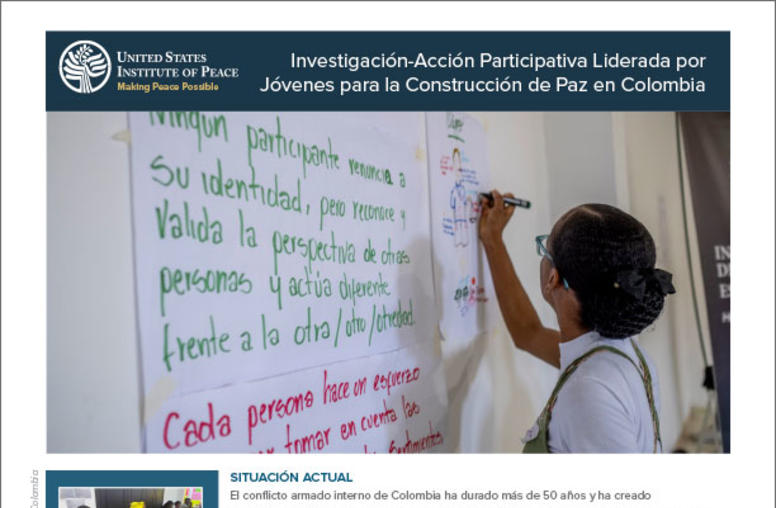
Tonight Colombian President Juan Manuel Santos confirmed the rumors that crested and then exploded after former President Alvaro Uribe tweeted that President Santos had authorized secret peace talks in Havana between government authorities and the Colombian Revolutionary Armed Forces (FARC), Colombia’s largest guerrilla group. In reality, the rumors had been bubbling beneath the surface for months, and in recent weeks, peace talks had emerged as a recurring theme on the editorial pages. When Telesur, RCN Radio, and Reuters broke the story earlier today that the Colombian government and the FARC had signed an agreement in Havana to open peace talks in Oslo, it seemed to force Santos’s hand.
In a parallel development, this morning Reuters released a video interview with Nicolás Rodríguez (aka “Gabino,”), the head of the ELN, Colombia’s second largest guerrilla organization. Gabino reiterated the ELN’s interest in pursuing talks with the Santos government as well. He charged that Santos had not taken the ELN’s interest in dialoguing seriously, and noted the ELN’s openness to consider a variety of formats, including participating in a single negotiating table with both guerrilla groups, or other multi-stakeholder options.
Santos issued a brief statement this evening from the Casa de Nariño. He confirmed that the government had made official contact with FARC guerrillas, and that he would provide the country with more details in coming days. The President acknowledged the ELN’s interest in participating in the process, and said he would not discount their participation in talks if they agreed to certain unspecified parameters. (View and read more here.)
In the meantime, the Colombian media are filling in additional details. Ultimas Noticias reports that Norway, Cuba, and Venezuela are backing the process, and that talks will begin in Oslo on October 5th and continue subsequently in Havana.
Several versions of the anticipated agenda have already been floated. Most include the following items:
- Disarmament and demobilization of the guerrillas;
- Political representation of the guerrillas in Congress;
- Ceasefire;
- Agrarian reform;
- Oil and mining concessions with multinational corporations;
- Environmental issues.
The FARC has also reportedly indicated its interest in engaging civil society in the peace process, although details of how that might be done have yet to surface.
President Santos has neither confirmed nor denied the specifics of the exploratory talks with the FARC or the path forward. He noted only that the process will be guided by lessons from past peace processes, that it will have as a goal the termination of the conflict, and that military operations and presence will continue throughout Colombian national territory.
If the past is any guide, we are likely to see an escalation in violence from both sides (as we have been seeing in recent months) as each party seeks to improve its position at the negotiating table. In the Colombian case, this has not been a very effective strategy. In the past, this strategy has gained little for the parties at the negotiating table, has strengthened those sectors most opposed to dialogue, and has undermined peace talks.
Santos has kept his proverbial key to peace well hidden, apparently convinced that his chances of safely delivering a peace agreement would be greater if the process was protected from media attention and public debate. This may be true in the earliest stages, when discretion is required to build confidence and explore potential minimums for agreement and test areas of possible concessions. Given the history of spoilers from some sectors of the military and the political right, it is understandable too that the Santos administration would want to have a solid process in place before it comes under attack. (One does wonder why Santos would bring Uribe into his confidence, as he seems to have done, before lining up greater political support.) That said, as rumors continue to fly, the time has come for Santos to bring the public along. Santos is not the only one with the constitutional obligation and right to seek peace. Santos should invite the allies and supporters of peace to be part of a process that opens the way to a political solution. Public discussion can provide important inputs to the process, and in the end, the public is an important stakeholder and must embrace any agreement if it is to be sustainable.
Santos would do well to convene the National Peace Council, a mechanism created under the Samper government in the 1990s to channel civil society participation into peace processes. This mechanism has lain dormant for years, but the structures and procedures could be easily revived. Likewise, given repeated UN Security Council resolutions (1325, 1820, 1880, 1888, 1889, 1960 and 1974) that underscore the need for greater involvement of women at every level of peacemaking, the highly capable female leadership that exists in the peacemaking field in Colombia, and the unspeakably high levels of sexual violence that have victimized nearly half a million Colombian women in the past decade, Santos and the guerrillas should make every effort to ensure that women are included in the negotiating teams so that their needs and relevant issues are addressed in ceasefire agreements, DDR (disarmament, demobilization, and reintegration) arrangements, and other accords. (Click here for recent UN guidance on this topic.)
Last week, two years into his tenure and at an all-time low in the public opinion polls, President Santos asked for the resignation of all 16 of his Cabinet Ministers—some say in order to reconstruct a team that would help him ensure the success of a negotiated settlement with the guerrillas and bolster his chances to be re-elected in 2014. Today everyone is waiting to see what comes next. The pendulum for peace has been given a healthy shove, and the momentum is about to accelerate.
This article was originally posted on Virginia Bouvier’s site Colombia Calls.


